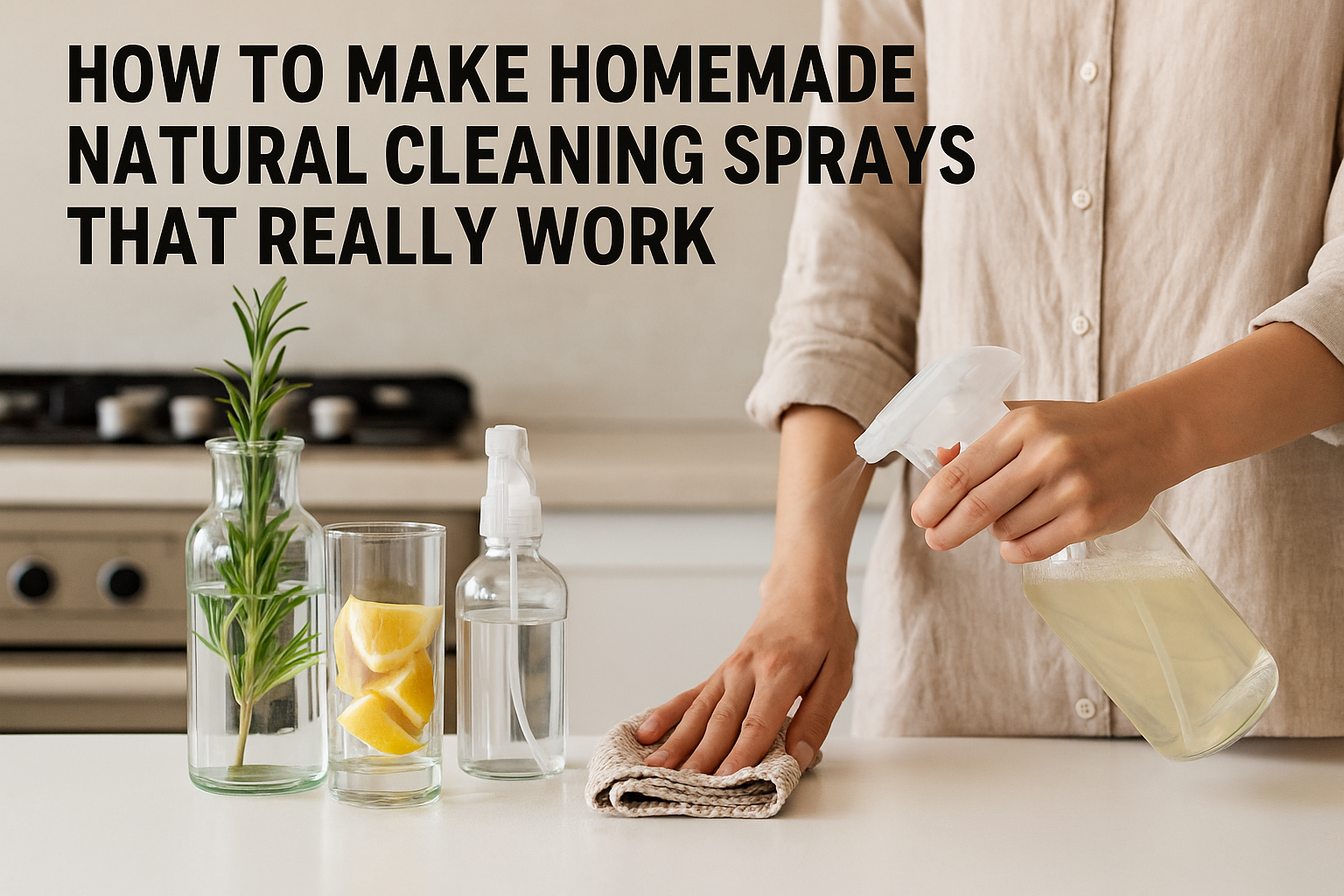Cleaning is part of every home routine, but most store-bought sprays come with problems.
They often rely on harsh chemicals, artificial fragrances, and preservatives that may irritate the skin, pollute indoor air, and leave residues unsafe for children or pets.
While these sprays claim to disinfect and freshen, they can be expensive and unnecessary when nature already provides powerful cleaning agents.
Homemade natural cleaning sprays are simple, effective, and safe. They rely on ingredients like vinegar, citrus, baking soda, alcohol, and essential oils to cut grease, disinfect, and deodorize.
These recipes have been used for generations, and with small adjustments they can compete with commercial products.
By learning to make your own sprays, you save money, reduce waste, and create a healthier environment for your family.
This guide will show step by step how to prepare natural cleaning sprays that truly work.
You will discover why these ingredients are effective, which combinations are best for each task, and how to adapt them for kitchens, bathrooms, windows, and fabrics.
Why natural cleaning sprays work
Natural ingredients are not a trend. They contain chemical compounds proven to clean, disinfect, and neutralize odors.
Vinegar dissolves mineral deposits and kills bacteria. Baking soda neutralizes acids and scrubs surfaces. Lemon peel releases limonene, a natural solvent. Essential oils such as rosemary, tea tree, and lavender bring antibacterial, antifungal, and deodorizing properties.
These substances work together in synergy. Vinegar provides the acidic base, alcohol speeds drying and kills germs, citrus cuts grease, and herbs extend freshness. Unlike commercial products, they leave no synthetic residue.
Benefits of homemade cleaning sprays
They are safer for children and pets, as long as oils are used in small doses. They cost less than industrial products. They are customizable for fragrance and strength.
They reduce plastic waste because bottles can be reused indefinitely. They also reconnect families with traditional cleaning practices, where herbs and citrus were everyday solutions.
Key ingredients and why they matter
Vinegar
Its acetic acid dissolves grease, soap scum, and mineral deposits. It is also antibacterial. Best for kitchens and bathrooms.
Baking soda
Neutralizes odors and acts as gentle abrasive. Good for scrubbing sinks and ovens.
Alcohol
Isopropyl or ethanol speeds drying and disinfects. Ideal for mirrors and windows.
Citrus peels
Orange, lemon, or lime release oils that cut grease and add pleasant scent.
Essential oils
Rosemary sharpens and disinfects, lavender calms, tea tree fights fungus, lemon uplifts and freshens.
Castile soap
A natural vegetable soap that removes dirt gently. Excellent for multi-surface sprays.
Basic all-purpose spray
This recipe works for most surfaces.
- 250 ml white vinegar
- 250 ml water
- 1 tbsp alcohol
- 10 drops lemon essential oil
- 6 drops rosemary essential oil
Mix in a spray bottle. Shake before use. Spray on counters, tables, or tiles, then wipe with a clean cloth.
Kitchen degreaser spray
Kitchens accumulate grease that needs stronger cleaning.
- 250 ml warm water
- 2 tbsp baking soda
- 2 tbsp white vinegar
- 10 drops orange oil
- 5 drops tea tree oil
Dissolve baking soda in water, add vinegar slowly, then oils. Spray on stovetops and greasy counters. Let sit for 5 minutes before wiping.
Bathroom disinfectant spray
Bathrooms require antibacterial power.
- 200 ml alcohol
- 200 ml water
- 10 drops lavender oil
- 8 drops tea tree oil
- 5 drops rosemary oil
Spray on sinks, toilet exteriors, and tiles. Let air dry. The alcohol disinfects while oils leave a fresh scent.
Glass and mirror spray
Streak-free glass is possible without ammonia.
- 200 ml water
- 200 ml alcohol
- 2 tbsp vinegar
- 5 drops lemon oil
Spray on glass and mirrors, then wipe with microfiber cloth. Leaves no streaks and dries fast.
Fabric freshening spray
Perfect for couches, curtains, and beds.
- 250 ml distilled water
- 1 tsp baking soda
- 1 tsp alcohol
- 10 drops marcela oil or lavender oil
- 5 drops orange oil
Shake before each use. Lightly spray on fabrics. Neutralizes odors without synthetic perfumes.
Step-by-step guide to making sprays
- Choose the right base. Vinegar for kitchens, alcohol for glass, water for fabrics.
- Select active ingredients. Baking soda for scrubbing, citrus peels for grease, essential oils for fragrance.
- Measure carefully. Too much oil can stain surfaces.
- Mix in reusable spray bottles. Dark glass helps preserve oils.
- Label clearly with date and ingredients. Homemade sprays last 1–2 months.
- Test on small area before spraying widely.
Traditional roots of natural cleaning
Gaúcho families relied on herbs and citrus long before commercial sprays existed. Rosemary sprigs boiled in water created cleansing solutions. Citrus peels were simmered to refresh kitchens. Vinegar mixed with sage was used to clean wood. These practices show that natural cleaning is not new but deeply rooted in tradition.
Safety considerations
Do not mix vinegar with bleach. Avoid spraying alcohol near flames. Keep essential oils away from children’s direct reach. Store sprays in cool, dark places. Always label to avoid confusion.
Extended recipes and variations
Heavy-duty oven spray
- 250 ml water
- 2 tbsp baking soda
- 2 tbsp vinegar
- 10 drops lemon oil
Spray inside oven, leave overnight, then wipe.
Floor cleaning spray
- 500 ml water
- 2 tbsp vinegar
- 1 tsp castile soap
- 8 drops rosemary oil
Spray on mop pads or dilute in bucket for floors.
Seasonal cleaning sprays
- Spring: lemon, mint, rosemary.
- Summer: orange, boldinho, lime.
- Autumn: guaco, cinnamon, orange.
- Winter: marcela, sage, lemon.
Antibacterial surface spray
- 250 ml water
- 1 tbsp alcohol
- 10 drops tea tree oil
- 6 drops rosemary oil
Effective for cutting boards and fridge handles.
Children’s play area spray
- 250 ml water
- 1 tsp vinegar
- 6 drops lavender oil
Gentle and safe for toys and play mats.
How to design a natural cleaning routine
Daily
Use all-purpose spray on kitchen counters and bathroom sinks. Spray fabric freshener on couches and beds.
Weekly
Apply degreaser to stovetops. Use bathroom disinfectant on showers. Wash floors with rosemary floor spray.
Monthly
Deep clean oven with baking soda spray. Wash windows with glass spray. Replace sachets and refresh blends.
Emotional and cultural benefits
Cleaning with natural sprays is not only practical. It reconnects you with heritage, reduces stress, and creates a home that feels safe and cared for. The act of spraying rosemary and citrus is symbolic of clarity and renewal. It makes cleaning less of a chore and more of a ritual.
Mistakes to avoid
Do not assume more oil means better results. Use small amounts. Do not store sprays too long; refresh monthly. Do not neglect labels. Do not expect natural sprays to smell as strong as commercial perfumes. Their freshness is subtle but healthier.
Long-term impact
By making and using natural sprays, families save money, reduce exposure to toxins, and strengthen cultural ties to herbs and citrus. Over time, these practices become family traditions, teaching children to clean with respect for health and environment.
Conclusion
Homemade natural cleaning sprays work because they combine the science of vinegar, baking soda, citrus, and essential oils with the wisdom of tradition.
They are safe, affordable, customizable, and effective for every room in the house. With a few simple recipes, you can replace industrial products and turn cleaning into an act of wellness and heritage.

Marcela Cardozo is passionate about Southern Brazilian traditions and the cultural stories carried through natural scents. She blends knowledge of native herbs, essential oils, and regional rituals to create practical and inspiring content. Her writing connects ancestral wisdom with modern living, offering readers simple ways to bring authenticity, well-being, and meaning into their everyday lives.
